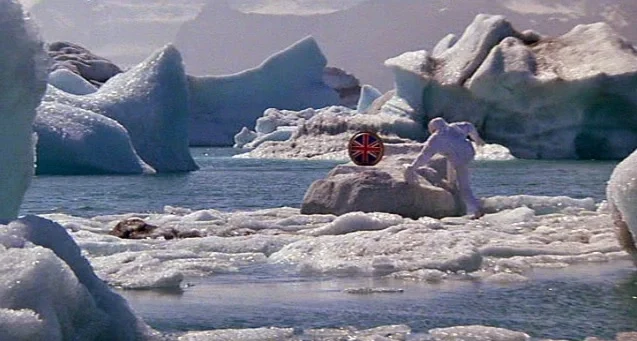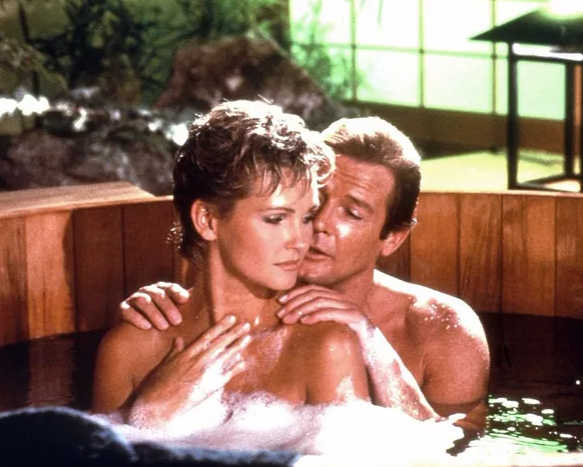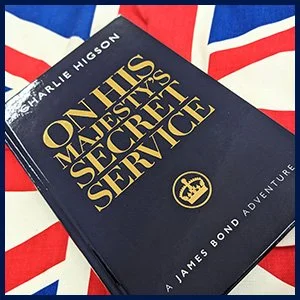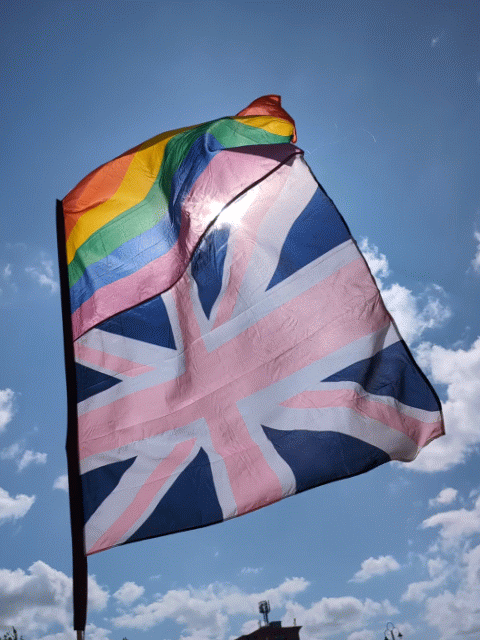No time to be discussing politics
Bond and politics don’t mix. So why, when Bond himself resists being drawn far along either end of the political spectrum, do both sides persist in wielding poor 007 like a blunt instrument?
Interviewed ten years after the release of Skyfall, Sam Mendes told the Hollywood Reporter “I would think twice about having Bond stand on the rooftops of Whitehall, with the Union Jack flags in the breeze”. The director cited the “serial incompetence” of Britain’s Conservative government in the decade following Skyfall’s release as the reason for his uncertainty about his creative choices. Mendes reflected that the British Establishment iconography “filtered” into the film because of the swelling of national pride at the time.
In the run up to Skyfall’s release, the London Olympics, the 60th anniversary of Queen Elizabeth II on the throne and the 50th anniversary of the Bond film franchise coalesced into a landmark cultural moment: the Queen seeming to arrive at the Olympic Stadium via Union Jack parachute, recreating 007’s daring pre-titles stunt in that other Jubilee Bond film festooned with British flags, The Spy Who Loved Me.
Mendes’ ambivalence about the ending of his own film is perhaps understandable. It’s a bit out of kilter with the rest of the Bond films; Skyfall is one of the few times in the series where symbols of Britishness are presented without a degree of playful irony. This playfulness steers the films well clear of being misconstrued as nationalistic. Even the iconic parachute in The Spy Who Loved Me draws as much of a laugh as a gasp. It’s sublimely ridiculous that a British undercover agent would announce his national identity to any onlooking enemies so brazenly. My own favourite use of the Union Jack in the series occurs in the pre-title sequence of A View to a Kill: the iceberg submarine announcing - hilariously - its friendly allegiance via a British flag emblazoned on the entry hatch.
Over the decades, the Bond filmmakers have taken pains to present British flags - and other patriotic symbols, including Bond himself - without pomposity. No sane person could ever use a Bond film to justify a nationalistic crusade. And yet, even a quick scan over comments on social media posts in the less salubrious parts of the internet could lead one to believe that Bond is, to use the uncouth vernacular, a “flag sh*gger”.
Now, when it comes to sh*gging, none of us would argue that Bond is anything other than prolific, but the focus of his amorous intentions is only ever people, never flags.
People on the far left are quick to label Bond a flag sh*gger for being an unapologetic symbol of colonialism. In the wake of Skyfall, Vice published an op-ed entitled ‘Why James Bond is the Mascot of the UK’s Right Wing’. The URL of the article indicates that the original headline was the more inflammatory ‘Why James Bond is the UKIP of action heroes’, referencing the now defunct political party headed by Nigel Farage, who now leads Reform UK.
On the flipside, people who are politically orientated far to the right are keen to cite isolated examples of Bond’s behaviour to validate views the majority would consider politically unacceptable.
Poor Bond simply cannot win, being wielded as a blunt instrument by those holding extreme views on both ends of the spectrum. This is despite Fleming himself stating that:
“He’s certainly got little in the way of politics, but I should think what politics he has are just a little bit left of centre.”
Which is just as well really: like any other civil servant, Bond would be expected to park his own political persuasions at the door when he arrived at the office every day.
While James Bond is undoubtedly a powerful symbol of British cultural identity (with all the historical baggage that brings, both good and bad), using him to bolster support for your political views - whichever way you swing personally - is simply not cricket.
Whenever someone attempts to engage me in any kind of Bond-inflected political ‘debate’ (usually them attempting to force their views on me and me waiting patiently for my chance to speak) I take my lead - as I do with so many things in life - from Roger Moore. Recall the scene in A View to a Kill (who can possibly forget it?) when a Russian agent attempts to draw 007 into a discussion about Détente. Bond sensibly sidelines the topic of conversation by ramping up the jacuzzi and turning up the Tchaikovsky. “This is no time to be discussing politics.” Indeed!
Not his line of country
We could argue that Bond is shutting down Pola’s politics chat so he and her can just get down to, er, business. But politics never exactly tickles Bond’s fancy elsewhere in the series. Daniel Craig’s Bond, while ostensibly more serious than Roger Moore’s, stubbornly refuses to consider the political angle of his actions, much to M’s chagrin. She’s the one who has to deal with Westminster’s “self-righteous, arse-covering prigs”.
The screen Bond’s aversion to getting stuck into politics is consistent with Fleming’s Bond. In the novel You Only Live Twice, Bond tells his ally Tiger Tanaka: “Seems to me I'm getting all balled up in high politics. Not my line of country at all.”
Bond’s political stance is most explicitly stated in the novel The Spy Who Loved Me. When Bond meets Vivienne Michel, a young Canadian woman who narrates the story, she tells him that her generation views the Cold War as “idiotic”. She says: “‘They ought to hand the world over to younger people who haven't got the idea of war stuck in their subconscious. As if it were the only solution. Like beating children. It's much the same thing. It's all out of date-Stone Age stuff.'” Bond unreservedly agrees with her assessment of the situation: “'As a matter of fact I agree, but don't spread your ideas too widely or I'll find myself out of a job.’”
Were Bond to find himself redundant, it’s doubtful that he’d be able to find gainful employment in what counts today as ‘journalism’. He’s simply too balanced for the job. So much of what gets churned out is merely intended to feed readers’ addiction to polarised opinion. Shock jocks and tabloid ‘journalists’ would have to get a real job if we weren’t all seeking the dopamine hit we get when someone agrees with us - or the rush of adrenaline we get when someone disagrees with us.
It takes far less effort to succumb to polarity than resist it. Charlie Higson made this the plot of his 2023 novel On His Majesty’s Secret Service, having Bond go up against a disturbingly credible modern day threat: a villain who sought to use a “paper-thin front of Patriotism” to further his own ends. Reaction to the book from some right-wing commentators was predictably hostile. Rather than engage with it, they merely wrote it off as “woke”, preferring to remain asleep to the notion that they could have more in common with a Bond villain than they were comfortable with.
Keeping the British flag up
In the relatively short time since the release of Higson’s novel, we’ve seen a startling increase in wannabe Bond villains throwing their weight (and often wealth) behind campaigns to create division, exploiting the anxieties of the disenfranchised for their own gain. Some of these efforts have co-opted the British flags as tools, just as Bond - another British symbol - gets brought out as back up for far right views. While it’s most commonly the English flag which gets dragged into it, it’s sometimes the Union Jack, and sometimes flags for specific regions of the country. Like in the Bond films, English/British/UK identities get conflated.
Even more mixed up in these scenarios are the many meanings which become attached to the flags. Of course, any flag can mean whatever you want it to mean but we British have a complex relationship with ours, in part because they have been used to intimidate minority groups. There’s sometimes a nervousness about displaying the St. George’s flag or the Union Jack at public events because of the negative connotations which have accrued over the years. Having myself grown up in one of the most multicultural parts of the UK in the 1980s and 1990s (although, like Bond, I’ve never truly grown up), I witnessed firsthand how the National Front tarnished the St. George’s flag. If you’ve seen the 2006 Shane Meadows film This Is England you’ll have a sense of how troubling this period was.
More recently, the latter half of 2025 saw a proliferation of ‘flagging’ in public spaces. The British Prime Minister was careful to both encourage flags being used to promote patriotic feeling, while also acknowledging that they could be “purely for divisive purposes”. Knowing the difference between patriotism and nationalism is key.
As a British person who is proud of their country, I find it bitterly ironic whenever the flag for the United Kingdom is used to stoke division, rather than unity. I get really upset when my flag - and the flag which represents every other British person, heedless of their other characteristics - is hijacked by people with nefarious intentions.
But I’m part of the problem. Recently, even I’ve felt a Mendes-like uncertainty about displaying our flags.
Previously, whenever there has been a big national celebration, I’ve adorned the front of my house and back garden with Union Jack bunting. It’s only very recently that I’ve started to question how this might make the neighbours either side of me - both ethnic minority households - feel. Whenever I hear of the flags being used to intimidate, I’ve started to think twice about flying them as freely.
But to not put them up would be the worst thing a genuinely patriotic person could do.
Why should I let the worst of society - the people who exploit the confusion of patriotism and nationalism - make me feel ashamed of being British?
There are many ways of being ‘British’. But whatever the definition (and it’s certainly not a competition) I’m about as British as you get…
Genetically, I’m even more 'British' than James Bond, whose origins are a combination of Scottish (a fellow Celt) and Swiss French. According to my DNA analysis on Ancestry.com, 89% of me is descended from the indigenous Britons (Celts). The remaining 11% comes from various invading Germanic tribes (Angles, Saxons, etc) with a smidge of Viking.
Britain has always been one of the most multicultural places on the planet. To argue otherwise is disingenuous. I was born in a multicultural area and I will always choose to live in multicultural areas. For me, they feel safer - and more alive - than areas where a particular ethnic group predominates. I was born in the West Midlands of England and, while I love travelling abroad, I have never lived anywhere else.
Since May 2023, thanks to King Charles III, I’ve been a Member of the Order of the British Empire (MBE). And yes, when I received the medal off Prince William, we did talk about James Bond.
I even edit a magazine called Keeping the British End Up.
Cut me and I bleed red, white and blue.
So why shouldn’t I, at the very least, put the Union Jack in my social media bios? Why shouldn’t I take every opportunity to fly the flag, pushing back at insidious attempts to shift the meanings of our nation’s flags? This is what we should all do: those of us who know the difference between patriotism and nationalism.
Looking back at Skyfall, I’m very glad Sam Mendes didn’t hesitate in having James Bond stand on the rooftops of Whitehall, Union Jacks fluttering in the breeze. As a presentation of patriotism, it’s uncharacteristically serious for the film series. But it needs to be.
Bond films never die. We rewatch them, on repeat, decades after their original release. When we watch Skyfall in years to come, we may or may not remember the circumstances of its production. The Union Jack may have taken on more unpleasant connotations - or it may not. We have the power to choose, with our actions. Only one thing is for certain: this rooftop scene is a defining moment for the character that will outlive its epoch; it will outlive the incompetencies of any particular political parties; and it will outlive the schemes of wannabe Bond villains.









